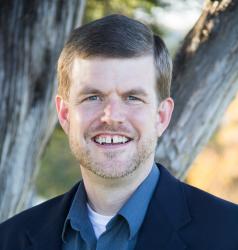In Believe: Why Everyone Should Be Religious, Ross Douthat relates a story from a couple of decades ago, in which he had a late-night conversation with the famously combative atheist Christopher Hitchens. (Hitchens went to meet his allegedly nonexistent maker in 2011.) He asked Douthat, a believing Catholic, to imagine for a moment that Jesus did actually rise from the dead. The tipsy and tired Douthat responded, “OK, let’s suppose he did.” “Well then,” Hitchens asked, “what would that really prove?”
Believe offers an erudite argument for the rationality of belief, as well as an exhortation to the wavering to go ahead and believe. The book is not so much for the staunchly unbelieving Hitchenses of the world but rather the secular coastal elites who might be open to faith. The intended reader for Believe is perhaps like a Hitchens who had lived longer, mellowed out, and given the resurrected Jesus a chance. For the wavering secularist, Douthat insists there’s good reason to commit to believing rather than defaulting to Hitchens’ brand of unmovable skepticism.
Douthat is best known as a conservative columnist for The New York Times. He has happily remained conservative and Christian since landing at the liberal flagship newspaper in 2009. Douthat’s position also shapes his intended audience for Believe. The book mainly seems directed at secular purveyors of “Official Knowledge,” presumably including people Douthat knows personally in the cosmopolitan northeast.
As an apologetic for the cultural literati, Believe is successful. It no doubt hopes to give some doubting elites pause as to why they’re not open to believing in God. Is it just because their peers might scowl and snicker at them? Douthat cites an impressive range of philosophical and scientific literature to show why theism makes more sense than materialism and unbelief do. Copernican and Darwinian thought disrupted some older church dogmas, but Douthat makes a strong case that modern science increasingly suggests the existence of a Creator. There is now broad consensus that the universe had a beginning (the Big Bang), though the theistic implications of that consensus are not obvious to professional scientists.
Likewise, no materialists seem able to account adequately for consciousness and the workings of the human mind. What the mind can do—for example, translating the act of reading a book into feelings of frustration or emotional resonance—is “still irreducible, an enigma, a mysterious substance unto itself.” Our creative thoughts and sublime feelings are impossible to explain by simple reference to the ebb and flow of chemicals in gray matter.
Seemingly supernatural or miraculous occurrences, such as instantaneous healings, also happen regularly. While there’s plenty of fakery involved with “faith healers” and herbal cures, credible healings are often reported by sources (such as doctors) who have no good reason to make them up. All told, Douthat contends that materialists should be on the philosophical defensive today, not those who believe in beings and powers beyond the material.
~ ~ ~
Although his case for a general belief in God and the nonmaterial realm is effective, Douthat’s book would be less compelling if he simply commended theism and avoided the issue of commitment to a particular religion. (In other words, it’s a much better book than the bland subtitle “Why everyone should be religious” implies.) Shifting people from detached agnosticism to detached theism is not his goal.
But, some skeptics would say, why choose a specific faith? Isn’t it better just to mix and match the world’s religions, taking the best aspects of each, or perhaps just embracing those areas that enjoy broad agreement between faiths? Douthat recommends humility about our ability to craft a “healthy way of being religious” in this manner. As a conservative, Douthat thinks that the wise and prudential path is to adhere to a religion that is time-tested and has a deep tradition on which to draw. And practice necessarily accompanies belief or it’s not real faith (a tenet on which world religions would agree). Mix-and-match spiritual beliefs don’t lead to practice; congregations of time-honored religions do.
Douthat also helpfully acknowledges some “stumbling blocks” that skeptics cite as barriers to belief. One is the classic question of how God can be all-powerful and all-good when He allows so many bad things to happen. There is no easy answer to this question, but neither does the mere question rule out trust in a loving and omnipotent God whose ways are higher than ours. Douthat deals more easily with the common objection that religious institutions, supposedly representing a good God, often do evil things. He suggests that it is people who do sinful things, and that people leading religious institutions hardly have the market cornered on evil.
Finally, he addresses the allegation that religious institutions are obsessed with sex. What this objection really means, in substance, is that most major religions have traditional restrictions on sexual habits that our modern secular culture celebrates, such as homosexual acts or transgender expressions. Any candid observer can see that people in the modern secular West, especially in entertainment culture and left-wing politics, are often more obsessed with sex than church folks are. Again, Douthat argues that a sexual ethic is an expected component of any comprehensive religion, since sex connects to issues as essential as marriage and procreation. It would be weird for any decent religion not to care about such matters.
~ ~ ~
If you know people who have sincere questions about God and religion, Believe offers a highly effective apologetic as well as a rationale for why Douthat himself is a practicing Catholic. My main concern is that readers should understand that the apparent audience for the book is atypical in American culture. Atheists and agnostics are hardly the most likely characters to visit your church. The “nones,” or people who adhere to no religion in particular, have been the rage in religion news for years, but even most nones still believe in God or a “higher power.” They’re not atheists or agnostics, despite many journalists’ conflation of the categories.
Recent survey data from the Pew Research Center—the leading proponent of “nones” storyline—also acknowledges that a strong majority of the U.S. population still professes Christian belief, even after more than a decade of breathless reports about how the nones are allegedly taking over American religion. About 7% of the American population say they are Jews, Muslims, Buddhists, or adherents of another religion. Around 19% of Americans reportedly believe in no religion, though this response conceals a vast array of idiosyncratic meanings. (Small but significant numbers of the “nones” attend church weekly, for example.) Atheists and agnostics rarely register as more than 5% of the population each. In other words, though they are overrepresented among elites, atheists/agnostics are a small cohort in the U.S. They’re an even smaller slice of world religion.
So the average American is not like Christopher Hitchens, nor is he like Douthat’s secular colleagues at The New York Times. Being agnostic is a religious luxury good; it’s neither the norm nor likely to become so any time soon. I am glad that Douthat is an apologist to this unbelieving cohort, but we shouldn’t act like they’re demographically typical. Nor are they sweeping the religious field.
The average American minister, therefore, should not imagine that his typical prospective congregant is an atheist or agnostic. More likely, unchurched neighbors are people who have a nominal theistic or Christian commitments and may even have been baptized as babies. Today they may just be busy living their lives without giving much thought to God’s claims on the same. That may well change when and if they get married, have children, or go through a personal crisis. But they’re not usually going to walk into church asking if they should be an atheist or believe in God.
I also wonder if Douthat puts too much emphasis on religious belief as a rational choice. I entirely agree with him that Christian belief is not irrational. But I doubt that most people who make a firm Christian commitment are like a religious studies major, comparing the world’s religions and pondering the warrant for belief. Douthat helpfully notes that people should feel no embarrassment about sticking at least nominally with the faith of one’s childhood (most people do so), but he still says that he personally chose an “expression of that faith [Christianity] that resonated more with my own ideas and experiences and personality.”
For all his comments about faith being lived out in community, Douthat seems to assume that our religion is something that, as children of the Enlightenment, we choose as rational individuals. But the most common this-worldly reason we become adherents to a specific religion is because we grew up in that religion. Sure, people in modern societies often switch denominations or make other adjustments (“I like the worship music better at Hope Fellowship than First Baptist!”), but familial legacy is still the primary determinant of one’s basic religious identity. For those who believe Christianity is uniquely true, this should encourage us to catechize our children and take them to church every Sunday. We should not tell them that their religion is their choice as autonomous individuals.
~ ~ ~
Finally, we must remember that faith is first and foremost a gift of God. Faith does not begin with our choices or even our familial context. As an evangelical Protestant, I am sure that Douthat and I do not see God’s role in salvation the same way. Still, there is historic Christian consensus that “faith is a gift” and that “believing is possible only by grace,” as the Catechism of the Catholic Church puts it. We may perceive the choice to believe as originating with us, but it really doesn’t. Without God’s gracious intervention, we would all in our hearts be like a late-night Christopher Hitchens, ignoring or reviling God, and scoffing at those who believe in Him.
Because true faith depends on God’s grace, there is hope even for the most hardened skeptic. In the Book of Acts, God converted Saul (Paul) of Tarsus, the chief persecutor of Christians, via a blinding vision on the Damascus road. He became the Apostle Paul, the chief evangelist to the Gentiles. If God can convert Saul, he can convert anybody.
Douthat ends with a heartening appeal to the unique truth of Christianity. He believes that “God acted in history through Jesus of Nazareth in a way that differs from every other tradition and experience and revelation. … Together the sources and the story and the Nazarene Himself all seem God-touched to a degree unmatched by any of their rivals. So where there is uncertainty, tension, a wager to be made, I make my bet on Jesus.” To this I say, “Amen.” I would only add that Christians can also move beyond “wager” faith. By God’s grace, we can also grow in assurance that Jesus is the Way, the Truth, and the Life (John 14:6).

